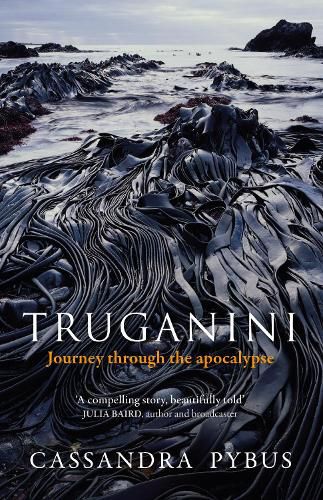Readings Newsletter
Become a Readings Member to make your shopping experience even easier.
Sign in or sign up for free!
You’re not far away from qualifying for FREE standard shipping within Australia
You’ve qualified for FREE standard shipping within Australia
The cart is loading…






**Winner of the National Biography Award 2021
Shortlisted for the Prime Minister’s Literary Award for Non-fiction 2021**
Cassandra Pybus’s ancestors told a story of an old Aboriginal woman who would wander across their farm on Bruny Island, in south-east Tasmania, in the 1850s and 1860s. As a child, Cassandra didn’t know this woman was Truganini, and that Truganini was walking over the country of her clan, the Nuenonne.
For nearly seven decades, Truganini lived through a psychological and cultural shift more extreme than we can imagine. But her life was much more than a regrettable tragedy. Now Cassandra has examined the original eyewitness accounts to write Truganini’s extraordinary story in full.
Hardly more than a child, Truganini managed to survive the devastation of the 1820s, when the clans of south-eastern Tasmania were all but extinguished. She spent five years on a journey around Tasmania, across rugged highlands and through barely penetrable forests, with George Augustus Robinson, the self-styled missionary who was collecting the survivors to send them into exile on Flinders Island. She has become an international icon for a monumental tragedy - the so-called extinction of the original people of Tasmania.
Truganini’s story is inspiring and haunting - a journey through the apocalypse.
$9.00 standard shipping within Australia
FREE standard shipping within Australia for orders over $100.00
Express & International shipping calculated at checkout
**Winner of the National Biography Award 2021
Shortlisted for the Prime Minister’s Literary Award for Non-fiction 2021**
Cassandra Pybus’s ancestors told a story of an old Aboriginal woman who would wander across their farm on Bruny Island, in south-east Tasmania, in the 1850s and 1860s. As a child, Cassandra didn’t know this woman was Truganini, and that Truganini was walking over the country of her clan, the Nuenonne.
For nearly seven decades, Truganini lived through a psychological and cultural shift more extreme than we can imagine. But her life was much more than a regrettable tragedy. Now Cassandra has examined the original eyewitness accounts to write Truganini’s extraordinary story in full.
Hardly more than a child, Truganini managed to survive the devastation of the 1820s, when the clans of south-eastern Tasmania were all but extinguished. She spent five years on a journey around Tasmania, across rugged highlands and through barely penetrable forests, with George Augustus Robinson, the self-styled missionary who was collecting the survivors to send them into exile on Flinders Island. She has become an international icon for a monumental tragedy - the so-called extinction of the original people of Tasmania.
Truganini’s story is inspiring and haunting - a journey through the apocalypse.
Cassandra Pybus’s Truganini tells the story of a journey full of deception and dead ends as George Augustus Robinson, ‘Protector of Aboriginals’, leads a group of Indigenous survivors from Lunawanna-alonnah around lutruwita on a mission of ‘conciliation’, which turns into an ill-fated scheme of deceit and control.
Pybus vividly paints Truganini (erroneously called the ‘last Tasmanian Aboriginal person’) as a bold, capable woman trying to manage her destiny while her people, culture and lands are destroyed. Truganini and her companions navigate the apocalyptic landscape of Tasmanian colonial genocide, where within a single generation many Tasmanian Aboriginal people living traditional lifestyles were either killed by colonists or kidnapped by Robinson and concentrated on Flinders Island.
Truganini, Wurati, Manalakina and other survivors bolt themselves to Robinson because he affords them the opportunity to continue to practice traditional culture, where all around them that culture is being violently suppressed. Robinson is dependent on his guides while in the bush, and is invited to partake in ceremony and To inducted into a traditional way of life. Robinson never fully accepts this invitation, and in the end betrays the people whose trust he needed for his mission of ‘conciliation’.
The real power of the book is its attempt to show, through Truganini’s eyes, the interaction between two cultures: one obsessed with extraction, status, and wealth; and the other defined by reciprocity, interconnectedness, and placedness. It’s a bleak history, and one many white Australians have difficulty swallowing, but it’s only through honest and emotionally sensitive engagement that white Australia can even begin to truly reconcile its genocidal past. Moreover, the book shows Truganini as a woman living her life on her own terms, not merely as a passive victim of an inevitable history.